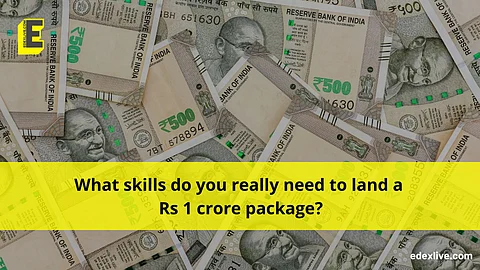

In the past five years, I have spoken to hundreds of engineers, product folks, and young founders. Many of them ask the same question, “What should I learn to land a Rs 1 crore job?”
The answers you’ll find online are predictable: “Master Python. Learn system design. Crack DSA. Get good at Leetcode.” All of that helps. But those are tools. They’re not why someone gets paid Rs 1 crore.
If that were the case, every top Leetcode performer would be a Vice-President (VP) by 25.
The one skill that cuts across every high-paying role
Whether you are a senior engineer at Google, a product lead at a fintech unicorn, or a founder navigating Series A, one skill makes all the difference: the ability to solve unstructured, high-stakes problems with clarity.
That’s it.
I have seen it in students who went from Tier 3 towns to building revenue-impacting features at top startups. I have seen it in leaders I have hired, who skip the noise, define the real problem, and make decisions that move the business.
At the Rs 1 crore level, you are not paid for effort. You are paid for judgment.
Technical skills get you in, clear thinking moves you up.
Anyone can learn how to write code. But not everyone learns how to think.
Let’s say a product metric is dropping. Most people jump straight into building a feature. A high-value individual pauses and asks: “Why is this happening?” They dig into user behavior, look at data critically, challenge assumptions and only then act.
This kind of thinking is rare. But it’s trainable.
Start doing short retros after every project. Write one-page decision memos. Before you suggest a fix, define the problem in writing. These small habits build a thinking edge and that’s what companies bet on at the top levels.
ChatGPT can write code. It can’t choose what problem to solve.
Tools are evolving. AI can now draft documents, build prototypes, even debug code. But tools don’t know which problems are worth solving. That’s still a human advantage.
Let’s take an example:
Should your team fix app performance or improve user trust?
Should you double infra or reduce churn?
There’s no obvious answer. That choice requires context, experience, and strategic clarity. That’s what differentiates you not how fast you can ship, but how well you can prioritize.
Own problems. Don't wait to be told.
Every ₹1 crore candidate I have met shares one trait: they take ownership before they’re asked.
They don’t just execute. They take accountability for results. They look at a broken system, a messy codebase, a confusing user journey and say, “This is mine now.”
But here’s something people miss, they’re not lone wolves. They invest time in learning from others. They ask better questions, connect with mentors, and surround themselves with thinkers who have done it before.
That one 10-minute conversation with someone 10 years ahead of you? Often more useful than another certificate.
Clarity is leadership
We often confuse leadership with managing teams or being loud in meetings.
Real leadership is reducing chaos. Bringing clarity when no one else can.
It’s being the person who says, “Here’s what we know. Here’s what’s uncertain. Here’s our next step.”
You want to be that person. Because when you can lead with clarity, people trust you with bigger problems. And that’s the fastest path to getting paid more.
Practice communicating outcomes, not effort
A senior leader doesn’t care how many late nights you pulled. They want to know what changed because of you.
Learn to communicate in outcomes:
“Reduced downtime by 80%.”
“Improved checkout conversions by 12%.”
“Launched GTM in 4 weeks across 3 markets.”
If you can write three bullet points like that in your next performance review or negotiation call, you’ll stand out.
So, what should you do now?
If you are serious about building towards a Rs 1 crore role, start here:
Think in problems, not just tasks
Spend 10% of your week identifying why you are doing what you are doing.
Reflecting relentlessly
After each project, ask: What went wrong? What didn’t I know? What would I do differently?
Document your wins
Keep a personal changelog. Every outcome you drive write it down. When the time comes, you'll have leverage.
Talk to people ahead of you
Find mentors, peers, even strangers on LinkedIn. Learn how they think, not just what they know.
Invest in thinking, not just tools.
Tools change. Thinking skills compound.
The Rs 1 crore journey is not reserved for the smartest or the fastest. It belongs to those who see clearly, think deeply, and act decisively.
And that, fortunately, is a skill anyone can build.
(Nishant Chandra is the Co-founder of Newton School. Views expressed are his own.)
